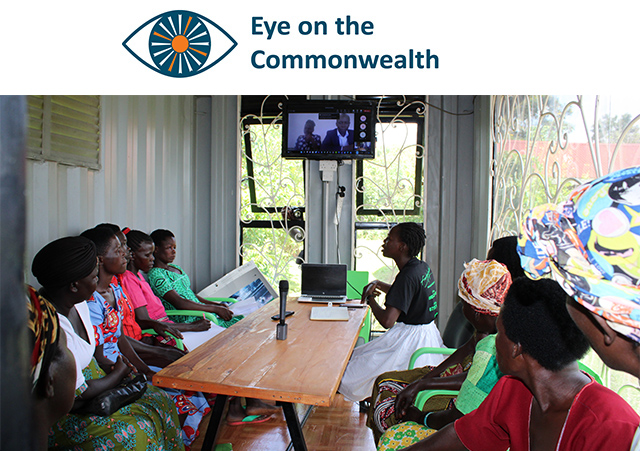 [photo: courtesy Barefoot Law]
[photo: courtesy Barefoot Law]
As part of an occasional series, we look at some of the innovative organisations around the world affiliated to the Commonwealth
While development in sub-Saharan Africa has accelerated since the turn of the century, the pace of change has been highly uneven. Many rural areas still lack access to sewage and electricity, but the telephony revolution has allowed even isolated regions to leapfrog decades of development in communications. While only 63% of Africans have piped water, 93% can access mobile phones.
With a median age of 17, Uganda is a country with one foot in the future: about 14 million people, or nearly a third of the population, use the internet. So it should be no surprise that the country is also leading the way in using digital technology to expand access to the law for ordinary people. And, appropriately for a country wracked by civil war for decades, it is a legal service inspired by the desire for greater conflict resolution.
BarefootLaw, a non-profit organisation, was set up in 2012 by Gerald Abila, a law student, to offer advice on legal issues, such as property disputes and writing wills. He realised that with 84% of the population living in the countryside (and the vast majority of lawyers living in the capital, Kampala), most Ugandans had no access to legal advice. Initially sending text messages on what he calls ‘frontline law’, Abila then set up a Facebook page, getting friends and fellow lawyers to help, but realised that he still could not keep up with demand.
Accredited organisations return to Marlborough House
Technology Catch-up with Chinese Characteristics: What Can Southeast Asia Learn from China?
Innovating University Education: Issues in Contemporary African Higher Education: A Book in Honour of Makerere University’s 90 Years of Excellence, 1922–2012
Disruptive technology
Eleven years later, using SMS, freephone numbers, radio, community-outreach programmes, social media and its website, BarefootLaw has helped nearly 970,000 people with free legal information, largely on conflicts over land, domestic violence and children’s issues, and commercial law. Its lawyers do not represent people in court. What it does do, crucially, is to simplify the issues for rural communities, even putting out role-playing videos on YouTube to better explain the law.
This eagerness to harness ‘disruptive technology to promote access to justice’, as Abila put it, has extended to developing artificial intelligence to expand the capacity of BarefootLaw. The organisation’s head of communications, Gertrude Lamunu Too-Rom, told Eye on the Commonwealth: ‘We seek to develop an artificial lawyer that matches or surpasses the proficiency of a human lawyer.’
In 2019, after six years of development and a summer fellowship at Imperial College Business School in London, BarefootLaw launched Winnie, an AI ‘lawyer’, to help deal with the 100 or so legal queries it receives every day. While it takes a lawyer 72 hours on average to respond to queries, they hope Winnie will reduce that to 24 hours. Technology is so central to their vision of the law that Abila also sees a future in which lawyers will be specifically trained to practise in the metaverse. ‘There’s no going back,’ he says.
In July BarefootLaw became a Commonwealth-accredited organisation. ‘This affiliation will enable us to learn from and collaborate with other change-makers,’ Abila said. ‘Together, we can drive transformative change and make justice a reality for millions.’
‘Eye on the Commonwealth’ columns look at current issues facing the Commonwealth
Find out more about the Commonwealth Round Table and the Round Table Journal
As part of that ambition, members of the team have been in Kenya, Tanzania and Malawi to look at ways to expand the scope of the BarefootLaw concept. They have also been fostering innovative approaches to improving access to justice in other Commonwealth countries, such as the Justice Innovators Recognition Workshop in Nairobi in August, which featured organisations such as the Dispute Resolution Hub, proponents of alternatives to litigation, and the Nyando Social Justice Centre, a grassroots organisation empowering women facing violence.
When one looks at how far Abila and his colleagues have come in the past seven years, what might have seemed an over-ambitious goal for BarefootLaw – ‘to make access to justice and the law readily available to 50 million people across Africa by 2030’ – does not seem unachievable at all.
Oren Gruenbaum is a member of the Round Table editorial board.



